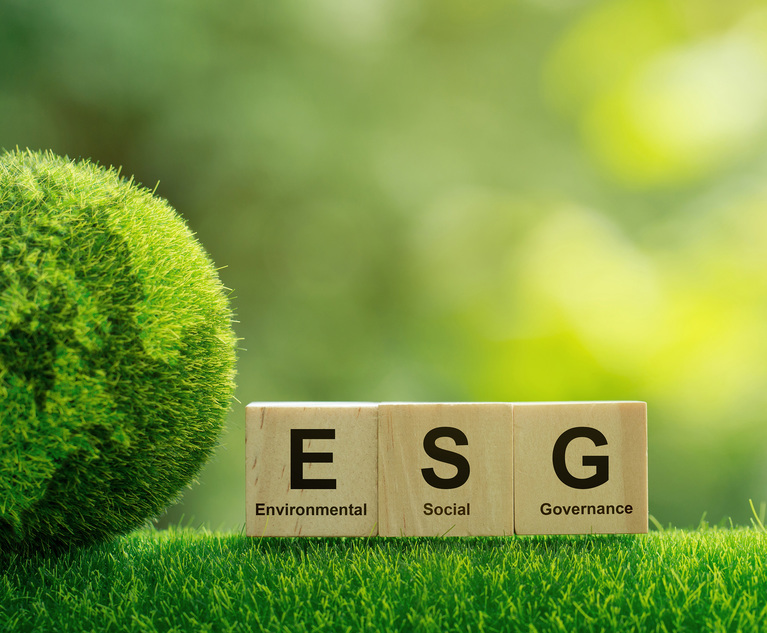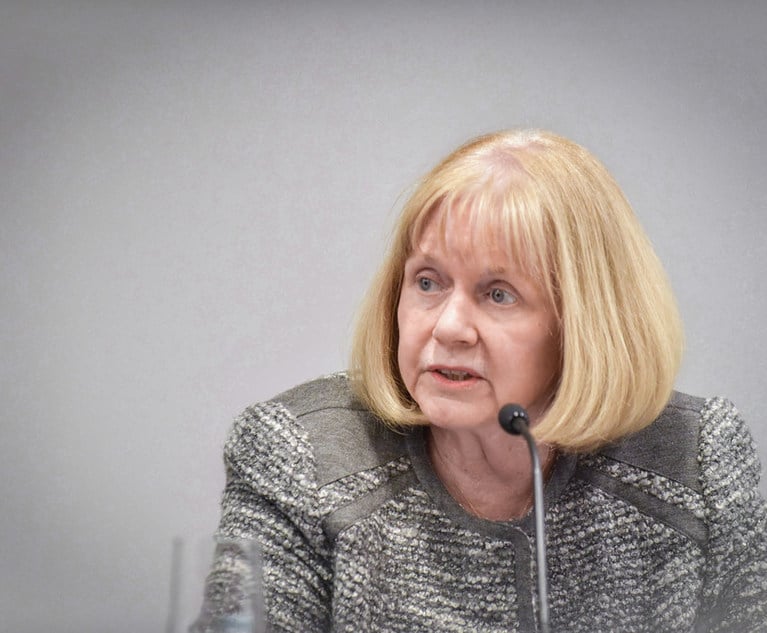 Credit: Pcess609/Adobe Stock
Credit: Pcess609/Adobe Stock 'Sleeping' ESG Loans Are a Worrying Trend, BNP Says
The head of sustainable capital markets at BNP Paribas said that some borrowers want the benefits of tying loans to environmental, social and governance goals without disclosing specific targets or performance metrics until a later date.
August 26, 2022 at 12:45 PM
4 minute read
Companies that get loans with an ESG label but no immediate sustainability targets are a worrying new trend, according to BNP Paribas SA.
Agnes Gourc, the head of sustainable capital markets at the French bank, told Bloomberg News that some borrowers want the benefits of tying loans to environmental, social and governance goals without disclosing specific targets or performance metrics until a later date.
Such "sleeping" sustainability-linked loans (SLLs) by companies, including Grosvenor Group Holdings Ltd. and Raven Housing Trust Ltd., have already raised concerns over exactly how they are related to social and environmental benefits, adding more fuel to a global debate about corporate greenwashing.
The stakes are high and rising as sustainability-linked debt grows in popularity. Issuers often view SLLs as an easier entry point into environmental, social and governance products than green bonds, as proceeds are not restricted only for ESG purposes.
Bloomberg Intelligence estimated that the market for ESG debt may reach $15 trillion by 2025. BNP Paribas is a leading arranger of traditional SLL deals, which posted a fourfold jump to a record $490 billion in 2021.
Below are Gourc's comments about sustainability-linked loans and other topics:
What Exactly Is a 'Sleeping' SLL?
This is a new type of agreement in the market which includes some elements of an SLL structure, such as potential margin adjustment, but crucially misses to define at inception what the key performance indicators (KPIs) or sustainability performance targets (SPTs) are. These are core elements of a SLL structure but they will only be agreed later in the loan agreement under this new construct. Having such intentions in the initial agreement is not sufficient to classify the instrument as an SLL, as has been confirmed by the Loan Market Association.
What Are the Risks to Such Loans?
The level of engagement with lenders may not be sufficient to set the material KPIs and ambitious SPTs during the term of the agreement, especially since changes typically require approval from a majority of lenders.
Can Transparency Be Improved?
It's still an area of development for annual targets to be disclosed, but we believe intermediary sustainability targets included in the agreement could be shared and help drive more material impact. And borrowers should at least disclose what the KPIs are.
What Are the Borrowers' Main Complaints About SLLs?
It is sometimes more time-consuming than they anticipated to put an SLL in place. Being accused of greenwashing is becoming a real concern as well, and this is why relying on rigorous expertise from solid sustainability coordinators is important. Our role is to ensure a strong compliance to market standards, in particular making sure KPIs are material and targets are ambitious and well received by the market.
We have contributed to the development of the International Capital Market Association KPI Registry, a comprehensive set of reference metrics generally viewed as material for each sector, and which we expect will be used across sustainable finance instruments.
Why Aren't the Social and Governance Parts of ESG More Popular?
Traditionally, environmental targets are science-based and therefore could be deemed easier to assess in some cases. It can sometimes be challenging to harmonize and quantify social or governance goals. They could be more relevant in some sectors, however, such as health care—and there are good suggestions in the ICMA KPI Registry.
What's the outlook for SLLs?
There's definitely further improvements to be done. SLLs will keep evolving and growing. The vast majority of borrowers will at some point question if they can do a SLL and every sector will likely see further development of sustainability linked finance, but abiding to strong market standards remains essential.
Jacqueline Poh reports for Bloomberg News.
NOT FOR REPRINT
© 2025 ALM Global, LLC, All Rights Reserved. Request academic re-use from www.copyright.com. All other uses, submit a request to [email protected]. For more information visit Asset & Logo Licensing.
You Might Like
View All
Disney's Black Eye Over Arbitration Gambit Likely to Linger, Underscoring PR Risks of Spurning Courts


Trump Organization's Independent Monitor Recommends Continued Oversight
Trending Stories
- 1State Budget Proposal Includes More Money for Courts—for Now
- 2$5 Million Settlement Reached With Stone Academy
- 3$15K Family Vacation Turned 'Colossal Nightmare': Lawsuit Filed Against Vail Ski Resorts
- 4Prepare Your Entries! The California Legal Awards Have a New, February Deadline
- 5DOJ Files Antitrust Suit to Block Amex GBT's Acquisition of Competitor
Who Got The Work
Michael G. Bongiorno, Andrew Scott Dulberg and Elizabeth E. Driscoll from Wilmer Cutler Pickering Hale and Dorr have stepped in to represent Symbotic Inc., an A.I.-enabled technology platform that focuses on increasing supply chain efficiency, and other defendants in a pending shareholder derivative lawsuit. The case, filed Oct. 2 in Massachusetts District Court by the Brown Law Firm on behalf of Stephen Austen, accuses certain officers and directors of misleading investors in regard to Symbotic's potential for margin growth by failing to disclose that the company was not equipped to timely deploy its systems or manage expenses through project delays. The case, assigned to U.S. District Judge Nathaniel M. Gorton, is 1:24-cv-12522, Austen v. Cohen et al.
Who Got The Work
Edmund Polubinski and Marie Killmond of Davis Polk & Wardwell have entered appearances for data platform software development company MongoDB and other defendants in a pending shareholder derivative lawsuit. The action, filed Oct. 7 in New York Southern District Court by the Brown Law Firm, accuses the company's directors and/or officers of falsely expressing confidence in the company’s restructuring of its sales incentive plan and downplaying the severity of decreases in its upfront commitments. The case is 1:24-cv-07594, Roy v. Ittycheria et al.
Who Got The Work
Amy O. Bruchs and Kurt F. Ellison of Michael Best & Friedrich have entered appearances for Epic Systems Corp. in a pending employment discrimination lawsuit. The suit was filed Sept. 7 in Wisconsin Western District Court by Levine Eisberner LLC and Siri & Glimstad on behalf of a project manager who claims that he was wrongfully terminated after applying for a religious exemption to the defendant's COVID-19 vaccine mandate. The case, assigned to U.S. Magistrate Judge Anita Marie Boor, is 3:24-cv-00630, Secker, Nathan v. Epic Systems Corporation.
Who Got The Work
David X. Sullivan, Thomas J. Finn and Gregory A. Hall from McCarter & English have entered appearances for Sunrun Installation Services in a pending civil rights lawsuit. The complaint was filed Sept. 4 in Connecticut District Court by attorney Robert M. Berke on behalf of former employee George Edward Steins, who was arrested and charged with employing an unregistered home improvement salesperson. The complaint alleges that had Sunrun informed the Connecticut Department of Consumer Protection that the plaintiff's employment had ended in 2017 and that he no longer held Sunrun's home improvement contractor license, he would not have been hit with charges, which were dismissed in May 2024. The case, assigned to U.S. District Judge Jeffrey A. Meyer, is 3:24-cv-01423, Steins v. Sunrun, Inc. et al.
Who Got The Work
Greenberg Traurig shareholder Joshua L. Raskin has entered an appearance for boohoo.com UK Ltd. in a pending patent infringement lawsuit. The suit, filed Sept. 3 in Texas Eastern District Court by Rozier Hardt McDonough on behalf of Alto Dynamics, asserts five patents related to an online shopping platform. The case, assigned to U.S. District Judge Rodney Gilstrap, is 2:24-cv-00719, Alto Dynamics, LLC v. boohoo.com UK Limited.
Featured Firms
Law Offices of Gary Martin Hays & Associates, P.C.
(470) 294-1674
Law Offices of Mark E. Salomone
(857) 444-6468
Smith & Hassler
(713) 739-1250







